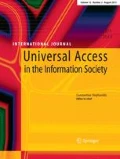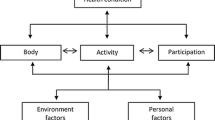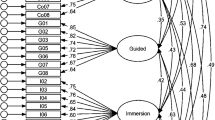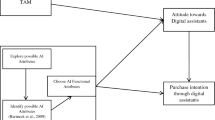Abstract
The goal of the present work is to investigate the potential acceptance of a set of web interaction aids by older adults, in order to help them overcome difficulties associated with ageing and help them continue using the web as a source of information, communication and services. This paper presents a survey with older adults concerning their perceptions about a set of web interaction aids defined after a field observation study, a study with questionnaires and user tests of web applications. The survey involved 313 participants, of which about 44 % were older adults and elderly users. The results showed that the use of aids to support the interaction of older adults with the web promotes improvements in the interaction of older adults and younger users alike, which supports the argument for enhanced universal usability. Finally, it was possible to diagnose barriers that still remain and which aids had best acceptance by older adults.



Similar content being viewed by others
Notes
Available online at http://agua.intermidia.icmc.usp.br/questionario, in Portuguese.
Five participants opted not to respond to question 4.
Seven participants opted not to respond to question 5.
Seven participants opted not to respond to question 6.
Two participants opted not to respond to question 7.
Three participants opted not to respond to question 8.
Three participants opted not to respond to question 9.
Three participants opted not to respond to question 10.
Three participants opted not to respond to question 11.
Two participants opted not to respond to question 12.
One participant opted not to respond to question 13.
Four participants opted not to respond to question 14.
One participant opted not to respond to question 15.
Twelve participants opted not to respond to question 16.
Five participants opted not to respond to question 17.
Four participants opted not to respond to question 18.
Four participants opted not to respond to question 19.
References
Burdick, D.C.: The aging imperative: designing for an aging population. In: Proceedings of the mini-conference of the South Jersey human factors and ergonomics society: human factors in complex sociotechnical systems, pp. 131–135 (2005)
Czaja, S.J., Sharit, J.: Preparing organizations and older workers for current and future employment: training and retraining issues. In: Czaja, S., Sharit, J. (eds.) Aging and Work: Issues and Implications in a Changing Landscape, pp. 259–278. The Johns Hopkins University Press, Baltimore (2009)
Chou, J.R., Hsiao, S.W.: A usability study on human-computer interface for middle-aged learners. Comput Human Behav 23, 2040–2063 (2007)
Convertino, G., Farooq, U., Rosson, M.B., Carroll, J.M., Meyer, B.J.F.: Supporting intergenerational groups in computer-supported cooperative work (CSCW). Behav Inform Technol 26, 275285 (2007)
Di Blas, N., Paolini, P., Speroni, M.: Usable accessibility to the Web for blind users. In: Proceedings of 8th ERCIM workshop: user interfaces for all, pp. 28–29 (2004)
Farkas, D.K.: The role of balloon help. SIGDOC Asterisk J. Comput. Doc. 17, 3–19 (1993)
Gonçalves, V.P., Neris, V.P.A., Ueyama, J.: Interaction of elderly users with mobile phones: flexibility to support diversity. In: Proceedings of the 10th Brazilian symposium on human factors in computing systems and the 5th latin American conference on human-computer interaction, pp. 343–352 (2011)
Grossman, T., Fitzmaurice, G.W.: ToolClips: an investigation of contextual video assistance for functionality understanding, pp. 1515–1524 (2010)
Hanson, V.L.: The user experience: designs and adaptations. In: Proceedings of the 2004 international cross-disciplinary workshop on web accessibility (W4A), pp. 1–11 (2004)
Hanson, V.L.: Technology skill and age: what will be the same 20 years from now. Universal Access Inform Soc 10(4), 443–452 (2011)
Hawthorn, D.: Possible implications of aging for interface designers. Interact. Comput. 12, 507–528 (2000)
Hawthorn, D.: How universal is good design for older users? In: Proceedings of the 2003 conference on Universal usability, pp. 38–45 (2003)
Hellman R.:, Universal design and mobile devices. In: Proceedings of the 4th international conference on universal access in human computer interaction: coping with diversity, pp. 147–156 (2007)
Hogeboom, D.L., McDermott, R.J., Perrin, K.M., Osman, H., Bell-Ellison, B.A.: Internet use and social networking among middle aged and older adults. Educ. Gerontol. 36, 93–111 (2010)
Brazilian Institute of Geography and Statistics(IBGE): Synthesis of social indicators 2008: an analysis of the life conditions of the Brazilian population
Brazilian Institute of Geography and Statistics (IBGE): National Census 2010: General Results (2010)
International Standards Organization: ISO 9241–171: Ergonomics of human-system interaction. Part 171: Guidance on software accessibility (2008)
Lara, S.M.A., Pietronero, W., Fortes, R.P.M.: Accessibility for older adults and elderly users in e-commerce. In: XVI Brazilian symposium on multimedia and the web–WebMedia 2010, Belo Horizonte, MG: SBC (2010)
Lara, S.M.A., Watanabe, W.M., Santos, E.P.B., Fortes, R.P.M.: Improving WCAG for elderly web accessibility. In: Proceedings of the 28th ACM international conference on design of communication, vol. 1, pp. 175–182 (2010)
Lara, S.M.A., Oliveira, D., Fortes, R.P.M.: Accessibility context sensitive to middle-aged adults and elderly in web systems. In: Proceedings of the 29th ACM international conference on design of communication (ACM SIGDOC’11), pp. 33–36. ACM, Pisa (2011)
Lara, S.M.A., Oliveira, D., Fortes, R.P.M.: Context-sensitive accessibility for older adults in web systems. In: Proceedings of the X Brazilian symposium on human factors in computing systems. orto de Galinhas, PE: SBC, pp. 353–357 (2011)
Lines, L., Ikechi, O., Hone, K.S., Elliman, T.: Online form design for older adults: introducing web-automated personalization. Presented at HCI, the web and the older population workshop, British HCI 2006 Queen Mary, University of London, London, UK (2006)
Lines, L., Patel, Y., Hone, K.S: Online form design: Older adults access to housing and welfare services. In: Proceedings of HCI and the older population workshop, workshop proceedings, HCI 2004, September 7–11, Leeds UK pp. 2122 (2004)
Kang, N.E., Yoon, W.C.: Age- and experience-related user behavior differences in the use of complicated electronic devices. Int. J. Hum. Comput. Stud. 66, 425–437 (2008)
Minister of Industry, Learning a Living: First results of the adult literacy and life skills survey, Canada and Organisation for Economic Cooperation and Development (OECD) (2005)
Páscoa, G., Gil, H.: Facebook and elderly users: the importance of social networks for life-long learning. In: Proceedings of the 7th Iberian conference on systems and information technology, pp. 544–549 (2012)
Righi, V., Sayago, S., Blat, J.: Towards understanding e-government with older people and designing an inclusive platform with them: preliminary results of a rapid ethnographical study. Int. J. Public Inform. Syst. 3, 131–142 (2011)
Sales. M.B., Cybis, W.A.: Development of a checklist for the evaluation of the web accessibility for the aged users. In: Proceedings of the latin American conference on human-computer interaction, pp. 125–133 (2003)
Santos, E.P.B., Lara, S.M.A., Castro, M., Fortes, R.P.M.: Horizontal drop-down menus: a case study with priority for older adults (in Portuguese). In: CLEI 2011, 2011, Quito, Equador. Proceedings of the Centro Latino Americano de Estudios en Informtica (CLEI 2011), vol. 1, pp. 1–10 (2011)
Santos, E.P.B., Lara, S.M.A., Watanabe, W.M., Castro, M., Fortes, R.P.M.: Usability evaluation of horizontal navigation bar with drop-down menus by middle aged adults. In: The 29th ACM international conference on design of communication (ACM SIGDOC’11), Pisa, Italy: ACM, pp. 145–150 (2011)
Sloan, D.: Two cultures? The disconnect between the web standards movement and research-based web design guidelines for older people. Gerontechnology 5, 106–112 (2006)
Small, J., Schallau, P., Brown, K., Appleyard, R.: Web accessibility for people with cognitive disabilities, CHI ’05 extended abstracts on human factors in computing systems, pp. 1793–1796 (2005)
Thatcher, J. & Waddell, C.: Constructing accessible web sites, Glasshaus (2002)
Zajicek, M.: Interface design for older adults. In: Proceedings of the 2001 EC/NSF workshop on Universal accessibility of ubiquitous computing, pp. 60–65 (2001)
Zaphiris, P., Ghiawadwala, M., Mughal, S.: Age-centered research-based web design guidelines. In: CHI ’05 extended abstracts on Human factors in computing systems, pp. 1897–1900 (2005)
W3C, Web accessibility for older users: a literature review. W3C working draft. Available online at http://www.w3.org/TR/wai-age-literature/ (2008). Accessed 18 Nov 2012
W3C, Web Content Accessibility Guidelines 1.0. Available online at http://www.w3c.org/TR/WCAG10 (1999). Access 18 Nov 2012
Acknowledgments
The authors would like to thank all the participants who contributed in this study for their most valuable input.
Author information
Authors and Affiliations
Corresponding author
Rights and permissions
About this article
Cite this article
de Lara, S.M.A., Fortes, R.P.d., Russo, C.M. et al. A study on the acceptance of website interaction aids by older adults. Univ Access Inf Soc 15, 445–460 (2016). https://doi.org/10.1007/s10209-015-0419-y
Published:
Issue Date:
DOI: https://doi.org/10.1007/s10209-015-0419-y




